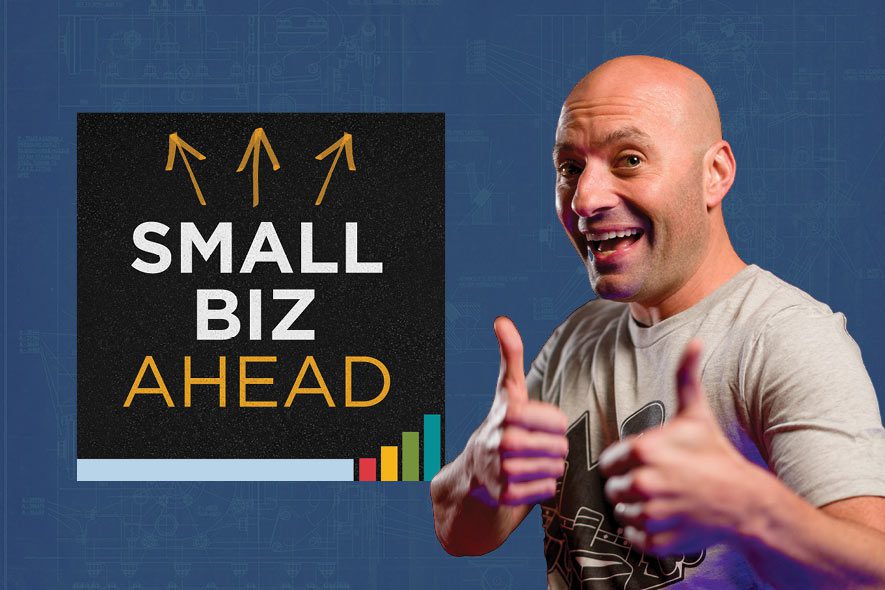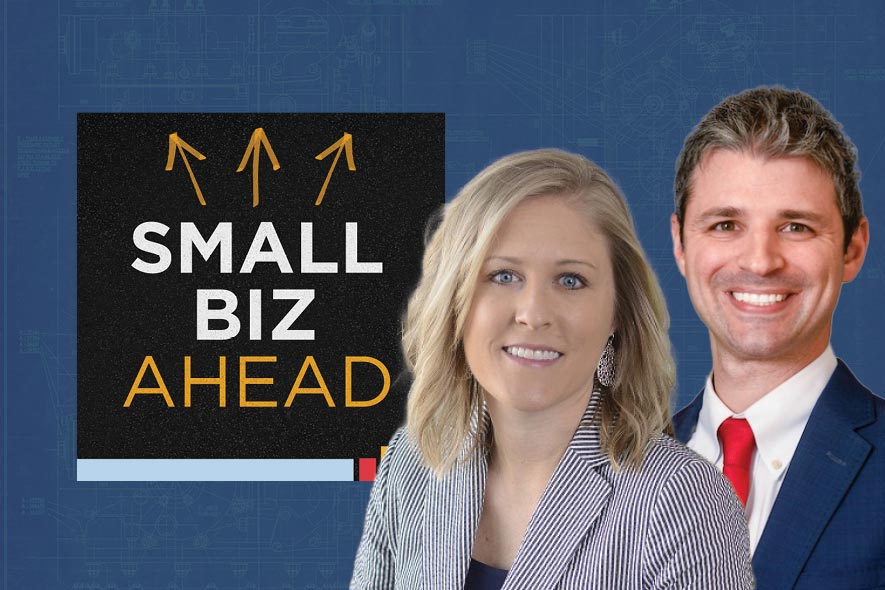Entering a relationship with a supplier or vendor is one of the most important decisions that you will make as a small business owner. After all, your vendor’s performance can have a direct impact on both the efficiency and service quality of your business. So, how do you know if a particular vendor is a right fit for you? In episode #144, Gene Marks and Elizabeth Larkin discuss the qualities you should look for prior to working with a potential vendor.
Executive Summary
1:42— Today’s Topic: How Do I Decide If a Vendor is Right for My Small Business?
2:04—When searching for potential vendors, one quality you should look for is strong communication skills. A responsible vendor will always provide a quick response to your messages.
4:09—Another favorable quality to look for in potential vendors is their willingness to collaborate on payment terms or plans.
4:25—The most successful vendors are those who stay proactive in their relationship with you because they value your business enough to stay competitive.
6:09—As a small business owner, you should be providing your vendors with a swift payment for their services.
10:13—Gene encourages small business owners to visit larger, self-service businesses to discover their competitors’ weaknesses. Finding these weaknesses will enable them to offer services that larger businesses can’t.
Submit Your Question
Links
Transcript
Elizabeth: Welcome back to the Small Biz Ahead podcast for another episode. I’m Elizabeth Larkin from The Hartford, and I’m here with Gene Marks from the Marks Group.
Gene: Correct.
Elizabeth: Which is a small business.
Gene: Yes, 10 people, located outside of Philadelphia, so a small business owner and I also write in a bunch of different places about all the things that give me headaches of running a small business.
Elizabeth: He comes here to answer your questions every week, so please send us your questions. You can submit them in the show notes. You can submit them on the Facebook post. We’d love to answer your questions. If you want to give us your name and location and what type of business you have, that’s great. If you want to do it anonymously, that’s great, too. We don’t have to say your name on the air. Just let us know.
Gene: Rest assured, if we don’t know the answers, we’ll just make them up.
Elizabeth: Yeah. Exactly. This week’s question is about how to decide the right vendor to work with. We are gonna answer that question after we hear from our sponsor.
Our Sponsor
This podcast is brought to you by The Hartford. When the unexpected strikes, The Hartford strikes back for over 1 million small business customers with property, liability and worker’s compensation insurance, check out The Hartford’s small business insurance at TheHartford.com.
Question: What Vendors Should You Work With?
Elizabeth: We’re back. That was a quick sponsor message.
Elizabeth: Okay, so this week’s question I think is really gonna resonate with a lot of people. It is: “When talking to potential vendors, what signs should I look for to gauge interest and compatibility?” So I’m gonna take a stab at this and then Gene’s gonna give the real answer.
Gene: Sure.
Elizabeth: The signs, so if you’re asking for signs, if I was looking to work with a vendor, I’d want someone who actually responds to my E-mails.
Gene: That’d be nice.
Elizabeth: And my phone calls. I know these are really basic, but I think a lot of times, people overlook this kind of stuff in the beginning because they’re excited to work with someone who’s gonna do something for them that they don’t have the ability to do in-house.
Gene: Right.
Elizabeth: I think really good communication in the beginning is very, very important. If someone isn’t able to respond to you in the beginning, once you pay them and they have a huge project underway for you or even a small project, if it’s really important to you and then they’re still not responding to you in a timely manner-
Gene: Huge issue.
Elizabeth: I wouldn’t even wanna be around Gene if someone did that to him. It would get really ugly.
Gene: It happens to me. Yeah, it happens to me. You’re saying responsiveness is a huge thing because a vendor is your partner.
Elizabeth: Yeah.
Gene: You’re relying on them for core products and services that you’re gonna need in your business to turn around to your customers, and if they’re blowing you off, that’s kind of a problem, right?
Elizabeth: Yeah. What if you are the vendor? I just wanna flip that around. If you are the vendor, when you pitch businesses, come use our business.
Gene: Sure. Sure.
Elizabeth: What do you tell your employees? Do you say you gotta be responsive within a couple hours, within 24 … what is your rule?
Gene: Yeah, our responsiveness is it’s not even a couple hours. It’s right away. As a business owner, we know that we are impatient people. We expect to get service right away. We do that for our customers, so we give that message down to our employees. I will tell you another thing. When I’m looking at vendors as well, who to work with, responsiveness rates are extremely high on my list. It’s not necessarily price. A lot of people are like, “Oh, if I’m evaluating a vendor, whoever’s gonna give me the best price is the person that I wanna work with the most.” I just reject that. I don’t think it’s a zero sum cost game, unless you’re looking at different vendors and the disparities are really significant.
You want somebody who’s gonna respond to your request. You need somebody that’s going to be reliable. Maybe somebody that will work with you on payment terms or even better yet, give you terms if you pay early or give you discounts if you have a certain amount of volume that you’re doing with that vendor. All of that, I think is critical things when you’re working with a supplier. I also don’t think that it’s anything wrong with always keeping your supplier on alert, always looking for other suppliers, always coming back to them. If you think you can get a better service or price-
Elizabeth: When you say supplier, you mean vendor?
Gene: Yeah, I meant vendor. Those names are interchanged, but I’m talking about if you’re buying in Mentorri or something specific for your business and you’re maybe getting it from this guy but you find some other guy down somewhere else that might be offering a better thing, I don’t think there’s any harm in having competing vendors among each other.
Elizabeth: Okay, so let’s recap. Potential signs you’re looking for to gauge interest and compatibility. Responsiveness-
Gene: Correct.
Elizabeth: Willingness to work on payment plans or pricing.
Gene: Correct, correct. And willingness to give you your credit for discounts if you pay earlier as well, okay?
Elizabeth: Okay.
Gene: Also, you want a vendor that’s proactive. They are proactive with you. You wanna make sure that you’ve got a relationship where people are staying as competitive as possible, so sometimes vendors just get lazy and they expect your order to keep coming in for whatever it is.
Elizabeth: Like you?
Gene: I don’t. We’re always looking for new work. We do technology services is what we sell, so it’s not infrequent that clients are like, “I was talking to some other firm that does what you do and they said this and that.” My attitude always is that if somebody’s making a good suggestion, we’re super open to it. I think that’s good. I’m confident enough in my ability to provide services that even if a competitor makes suggestions, I know that I’d be open to hearing what those suggestions are. I want what’s in best interest for my clients, is what we wanna do. Another thing I just wanna say about when we talk about vendors, a lot of times people say that, “Oh, they’re a really good source for cash flow.” Oh, don’t get a loan from the bank, Elizabeth. You’ll get financing off your vendor. Just switch out payments.
Elizabeth: I don’t understand that.
Gene: Just stretch out your payments to your vendors. You know what I mean? I know they’re asking you to be paid in 30 days, well hold on to your cash. Pay them in 60 or 90 days.
Elizabeth: That’s a terrible thing to do.
Gene: People do it all the time. That’s like the story of my life because they use that for financing for their own cash flow.
Elizabeth: There are other small business owners. Everyone should be respectful of each other.
Gene: You would think. It’s not all the time. I sell to a lot of larger companies as well. Ask any business owners the games that large corporations play with their smaller vendors because they’ve got leverage over them.
Elizabeth: Yeah.
Gene: Sometimes, it’s very, very frustrating to do. I would never be that way with my vendors. In fact, I like to pay them early for a couple of reasons. One is I don’t mind getting a discount if they’re offering which is good, but I rely on my vendors to provide certain software, hardware, contracted services. If I’m monkeying around with payments to these people, how would you feel?
Elizabeth: Oh. Yeah.
Gene: You’d be like, um. I call and I need something in an emergency for a client and you’re like, “This guy has been playing around with me for the past couple of years.” I’m like, “I got other better clients to deal with.” I think vendors are your partners. Suppliers are your partners. You should be treating them with the respect that you would treat a partner.
Elizabeth: Great. Alright, let’s recap. One responsiveness, two willingness to work on some type of payment plan. I think when you say payment plan, people think, “Oh, I’m not gonna get paid.” You’re really saying discounts if you pay early-
Gene: Yeah. Right. They can be somewhat flexible with you on pricing, that’s correct. I get it if you’re a small business. A lot of times, vendors, they’re gonna be like, “This is what it is.” I get that. When they quote your prices, but maybe flexible in can you get 45 days instead of 30 days? Can we get a cash discount, like a two percent net 50, or if you say to your vendor, “Listen, if I hit a certain level of sales, can we get certain discount off the price of the product?” If your vendor’s saying, “No, no, no, no,” to all that stuff, I don’t know. That’s not a great sign of encouragement that they really want your business.
Elizabeth: Not a great relationship.
Gene: It’s not a great relationship. Don’t monkey around with your vendors. Once you find good people that you’re working with, suppliers of your inventory services, pay them on time. Pay them early, you know? Treat them like a partner like you would want to be treated. I’m telling you, long-term, they are extremely important to your business.
Elizabeth: A lot of small businesses are vendors. They’re playing that role, and then they also have vendors. This should be a really mutual beneficial relationship.
Gene: It’s funny that you say that. Sometimes, I get people that string out payments with me. Other business owners, and I think to myself, “How would they feel if their customers were doing it to them?” Maybe that is why they’re doing it to me because their customers are doing it to them. I couldn’t agree with you more. You’re a small business owner. You should know what it feels like when you’re not getting paid on time. Imagine how the vendor feels as well. We should talk about another episode, and we should mark this down is about how to do business with big co. You know?
Elizabeth: Oh, great. Okay.
Gene: I’m not only selling to big co but also buying from big co. There’s a lot of companies out there that are looking to sell into big companies like Walmart and Target and whatever, or other large companies and how do you try to protect yourself? Future episode.
Elizabeth: Great. Alright. We’ll be right back with Gene’s word of brilliance.
WORD OF BRILLIANCE: Walmart
Gene: I just mentioned Walmart. That’s my word of brilliance today is Walmart, because recently Walmart announced that they were testing out an entirely cashier-less store in a location down I think it’s in Dallas. What they’re doing is they’re sort of following in the footsteps of Amazon. Amazon has announced they’re gonna have three thousand cashier-less grocery stores around the country. They’ve already got a few of them live in Seattle and I think one they just opened in Chicago. Walmart is doing the same thing. Walmart store is a little different. Same concept, you walk around, you pull items off the shelves, you stick them in your cart, you zap it with your phone and then you’ve got payment set up and boom. You’ve paid it, so no cashiers. It sounds great for the consumer. Walmart is putting people by the door just to spot check purchases. That’s what they’re asking to do, but it’s a customer experience thing. Let’s face it. It’s an overhead thing as well. We have to admit the fact that there’s less employees that are involved.
Here’s why I bring this up, two things. If you are a small business competing against these big companies that are going cashier-less, go Bizit them and see what the experience is like and say to yourself, “How can we show that we are such a better service than what these guys are?” Look for the failings in their cashier-less operations that they’re doing and think to yourself, “This is a selling opportunity.” You can go to the big box store with the cashiers, but can you get the same type of service that you’re getting from me? Bizit and compare and come up with a strategy to compete against that.
Elizabeth: Can I ask a question about this?
Gene: Sure.
Elizabeth: This is something I’ve brought up before. Why couldn’t a small business do that by just having point of sales systems on their employees’ phones?
Gene: Couldn’t agree with you more. The question is it’s not just the employees’ phones, but why couldn’t more small businesses have self-service kiosks? It’s clearly what Walmart is doing and what Amazon’s doing. I go into the CVS stores, there’s self-service kiosks. We should be. The biggest reason why is cost. It’s technology that you have to invest in.
Elizabeth: Yeah, but a point of sales system, so let’s say I’m just making this up. Let’s say you have a small retail store. You have five people working there. If they were all out on the floor walking around with their phones and could check people out like that, that’s not that cost.
Gene: I agree. There are many great point of sales systems like Revel, and Magento, and Shopify that give you all the opportunity to put this stuff on mobile devices, tablets, and phones. Have your employees, they can set up the self-service kiosks as well. I think for most businesses, I think most people if you’re watching, you’ll agree. There’s a cost to doing that. There’s also a big disruption, too.
Elizabeth: About how much?
Gene: I’ll tell you how much.
Elizabeth: I don’t mean to put you on the spot.
Gene: No, it’s okay. The actual units themselves are in the hundreds of dollars, so it’d be a hundred to two hundred bucks, if you were to buy a self-service like a unit, okay? Even if it’s a tablet, alright? The apps, you’re not gonna put this on your employees’ phones. It’s gotta be a store-owned device. It’s not gonna be your employees’ iPhones. There’s a hardware cost to that. There’s a software cost to that, and these software systems charge again hundreds of dollars a month per user to get yourself-
Elizabeth: Oh, okay. I didn’t realize it was that expensive.
Gene: Oh, yeah. There’s a setup cost. Somebody’s gotta go in and do all, ’cause what do we know about doing that stuff? Somebody like me, that’s what my firm does some of that stuff. Not for retail, but other stuff. You gotta get hires to come in and do that. Elizabeth, there is disruption. All of your employees have got to learn what to do. If you’ve got an existing system, you wanna migrate. Say you got a system with thousands of inventory items in Quickbooks and you wanna migrate it all over to a new system. That’s a real disruptive thing. It’s a headache to do, but I’m glad you asked the question because if you’re a merchant, you gotta read the writing on the wall.
If Amazon and Walmart are successful in what they’re doing, it is gonna create a wave of self-service retail stores around the country and customers are going to expect those options when we go in to buy, and it could be off putting to some of your customers if you don’t have those options available, so prepare. It’s not that far out in the future, but maybe far enough where you can talk a little few bucks away and save up some money to invest in that technology. It’s coming. It’s coming.
Elizabeth: Cool. Alright, thanks for joining us everyone. We’ll be back in a couple days with our next episode. Thank you.
Download Our Free eBooks
- Ultimate Guide to Business Credit Cards: The Small Business Owner’s Handbook
- How to Keep Customers Coming Back for More—Customer Retention Strategies
- How to Safeguard Your Small Business From Data Breaches
- 21 Days to Be a More Productive Small Business Owner
- Opportunity Knocks: How to Find—and Pursue—a Business Idea That’s Right for You
- 99 New Small Business Ideas





